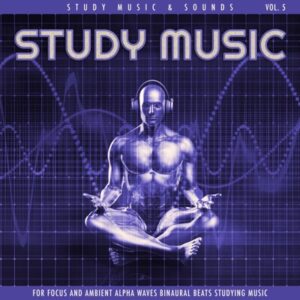As writers, we inevitably experience writer’s blocks. Other times, we lose focus and concentration. When this happens, our writing suffers. Well, fret no more. Want to improve your writing? Try listening to binaural beats.
*Disclaimer: It’s not for everyone, though. Read on to find out.
I have listened to binaural beats which improve concentration, and have found that it helps me focus on writing my stories. I write more words than usual in a given day. You need to listen with a headphone or earphones for maximum results.
While some recommend consistently listening to it daily, it is suggested that we only do so for a short period of time every day, taking breaks.
But first: a backgrounder.
What the Heck are Binaural Beats & How do they affect Writing?
Binaural beats are the beats your brain processes when you hear two tones, one in each ear, that are different in frequency. For example: In your left ear, you’re listening to a sound with a frequency of 132 Hertz, while in your right ear, you’re listening to a sound with a 121 Hertz frequency. Simultaneously, your brain processes the difference of these two frequencies—which is 11 Hertz—which results in you hearing a tone at an 11 Hertz frequency instead of two different tones.
Know what’s weird? There is no physical beat. It’s all in your head. That’s why binaural beats are also called auditory illusions. Some claim that they work as “digital drugs” which “biohack” the brain, powering up memory and creativity and eliminating stress–which can immensely improve your writing.
Prussian physicist and meteorologist Heinrich Wilhelm Dove (1803–1879) discovered binaural beats in 1839. One hundred thirty-four years later, biophysicist Gerald Oster published an article in Scientific American on 1973, offering fresh insight and new research findings. Oster saw binaural beats as a powerful tool for cognitive and neurological research.
Is it true, though?
Scientific Evidence for Binaural Beats
There is some evidence that binaural beats synchronize brain activity. In a 2020 research paper, scientists published the result of a study made on the efficacy of binaural beats in the human mind. It was observed that far apart brain areas synchronized with each other at a different frequency than the beat. They concluded that this may be how binaural beats improve memory and focus. They stipulated, though, that binaural beats do not affect mood and still require more study for more conclusive evidence of its health benefits.
The problem with binaural beat research is that it is not known how the illusion of binaural beats is generated in our brains, or which brain networks are affected by them. The effect is different by age and gender, and also by brainwave, frequency and length of listening time. Science does not have a clear-cut conclusion yet.
But many had tried binaural beats and had amazing results. A person with trigeminal neuralgia, a facial disorder, claimed that she was “happier, better rested, and not in pain. [Binaural beats] are one of the best things to happen to me.” Volunteers from Europe and Montreal claimed they slept better and their anxiety reduced after listening to binaural beats for a specific period of time. In Richmond, Virginia, adults with chronic pain observed that their pain lessened. Some data also indicated that binaural beats are effective in managing tinnitus or ringing of the ears.
Are Binaural Beats Safe for Everyone?
Certain types of people are warned not to listen to binaural beats as doing so may possibly harm themselves instead. These are:
- persons with epilepsy or suffer from seizure
- persons with heart condition or with pacemaker
- persons taking tranquilizer or suffering from mental or psychological disorders
- children and pregnant women
- people working, driving, or operating large machinery
What do you think? If you’re not among the list above, it doesn’t hurt to give it a try.
Here is what I listen to when I want to be focused:
References:
- https://www.healthline.com/health/binaural-beats
- https://www.discovermagazine.com/mind/binaural-beats-the-auditory-illusion-people-claim-can-heal-your-brain
- https://simple.wikipedia.org/wiki/Binaural_beats
- https://www.sciencedaily.com/releases/2020/02/200217143447.htm
- https://www.eneuro.org/content/7/2/ENEURO.0232-19.2020
- https://knowingneurons.com/2017/12/21/binaural-beats/
- https://www.healthline.com/health-news/your-brain-on-binaural-beats#1
- https://patch.com/new-york/plainview/a-quick-guide-to-binaural-beats















1 thought on “Want to Improve your Writing? Try Listening to Binaural Beats”